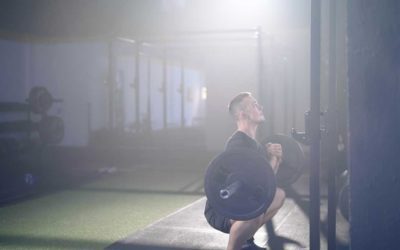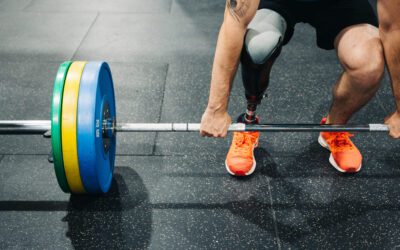BIRTHFIT: Strength Training for Bad*ss Moms
TOPIC: Strength & Conditioning
BIRTHFIT offers expert strength training for women throughout the entire motherhood journey from prenatal to postpartum.
Lindsey, Leah, and Kate provide a supportive, intelligently-guided fitness community for moms and athlete moms-to-be. They take into account recovery, mindset, healing, and whole-body wellness to help moms train to be moms.

Written By
Lily Frei
Lily is TrainHeroic’s Marketing Content Creator and a CF-L1 with an English background. She was a successful freelance marketer for the functional fitness industry until being scooped up by TrainHeroic. An uncommon combo of bookish word-nerd and lifelong athlete, Lily is devoted to weightlifting, CrossFit, yoga, dance, and aerial acrobatics.
Q&A with BIRTHFIT Founder and Coach, Lindsey Mathews
The information age is an amazing thing. As our collective body of knowledge grows, it challenges so many archaic and outdated ideas with science. Excitingly, the research around bringing another human life into the world is finally evolving in favor of mothers’ real-life experiences.
Strength athletes, triathlon competitors, soccer players, cyclists, gymnasts, dancers – professionals and hobbyists – all want to be able to keep doing what they love through pregnancy and motherhood. In modern times, it’s actually possible. The trope of the “fragile pregnant woman” is dissolving. Emphasis on being a strong, healthy parent for your kiddos is at the front of our minds today more than ever.
It’s no question that moms are superheroes. And in the spirit of Mother’s Day, we wanted to shine a light on BIRTHFIT – one of the most supportive, intelligently-guided fitness programs for moms and athlete moms-to-be. BIRTHFIT provides expert training options for the entire motherhood journey, taking into account things like recovery, mindset, healing, and whole-body wellness to help moms train to be moms.
I spoke with Lindsey Mathews to hear her story and get some background on the BIRTHFIT programs, and boy did I learn some things in just our short conversation.
(Dads, don’t sleep on this one! Knowledge is power!)
How did BIRTHFIT get started?
BIRTHFIT started as I was navigating my different roles and responsibilities in the world – I was a chiropractor, a birth doula, and an S&C coach. I tried to keep all the lanes separate, but eventually it just made sense to combine my training and see how one role could enhance or influence another.
I started a blog to share my experiences and research in the birth world, to question and challenge the status quo, and to remind women that they have a voice. I grew up pretty standard American, so what I saw on TV was birth in hospitals, and it’s definitely not like that as much anymore. Then I got to attend home births and birth center births, and it was a whole new world of choice.
I also realized when women at the gym would get pregnant, coaches didn’t know what to do. At the time there wasn’t much research on general strength and conditioning for pregnancy or postpartum. There were no baselines or strength oriented recommendations, only light aerobics. So women were confused and often either stopped everything OR continued hammering intense fitness routines with little guidance.
BIRTHFIT was born out of an appreciation of the motherhood transition, while taking into account prehab and rehab that must be done in order to integrate back into life.
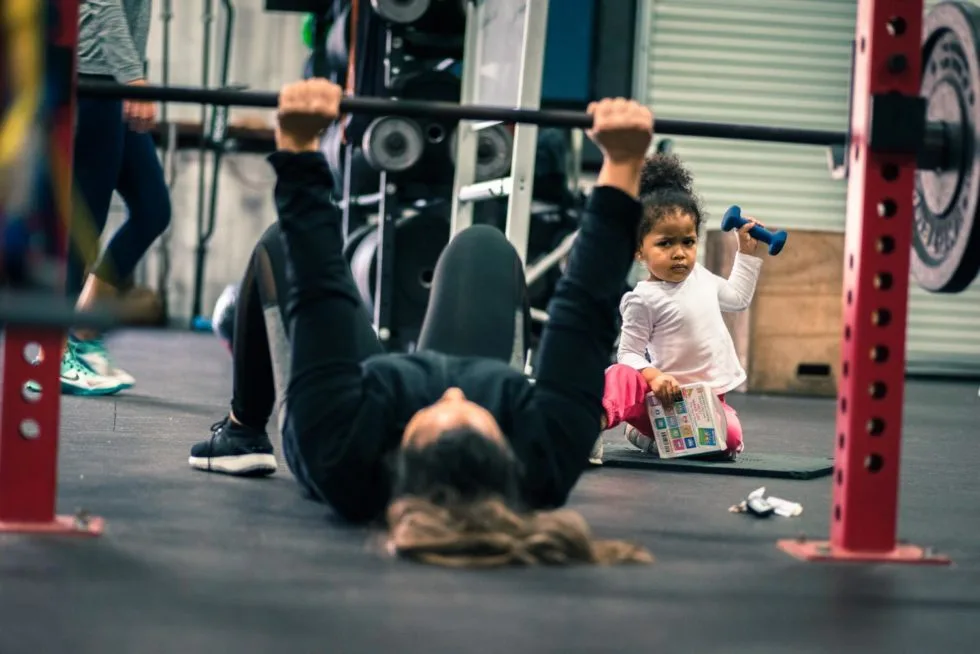
Tell us about your pregnancy workout programs for moms and moms-to-be!
We have BIRTHFIT Prenatal – a holistic, full-term prenatal program for general strength and conditioning that supports the nervous system and maintains strength during pregnancy. It’s four days a week with an active recovery day and is designed to get your body ready for birth.
Then we have the post-partum side. When I blew out my ACL, I knew exactly what rehab I was supposed to be doing 3 weeks, 6 months, a year post-op. But there was nothing like that for postpartum or cesarean recovery, which is a major abdominal surgery. Basically you get OB advice like “at your six-week visit, you’ll be cleared for sex and exercise.” So then, athletes jump back into Crossfit classes or triathlon training with no baseline rehab.
So we recommend 30 days of lying-in, no matter a woman’s athletic abilities. That’s 30 days of just straight chillin. Many countries that have a super low rate of postpartum mood disorders implement things like a lying-in period. We see fewer injuries when people take that period, but we realize it’s hard for the type-A athlete moms. So we have a program that gives you short sessions each day for breathwork, posture and positioning, just something physical to get the wheels turning.
BIRTHFIT Basics program starts at around 4-5 weeks. That includes movements and poses that we as humans are designed to do. It’s another 30 days of functional rehab work to make sure you have a solid foundation for returning to athletics. After that, moms can increase the volume and add more complex movements with the BIRTHFIT Postpartum program for 12 weeks of fitness building on the Basics.
We have a monthly membership option to support women in the various other seasons and cycles of their lives. So, general S&C in harmony with their menstrual cycle and fertility awareness methods. We also offer a Return to Running program for our runner moms, virtual coaching and consultations to help moms choose the right program and customize their experience.
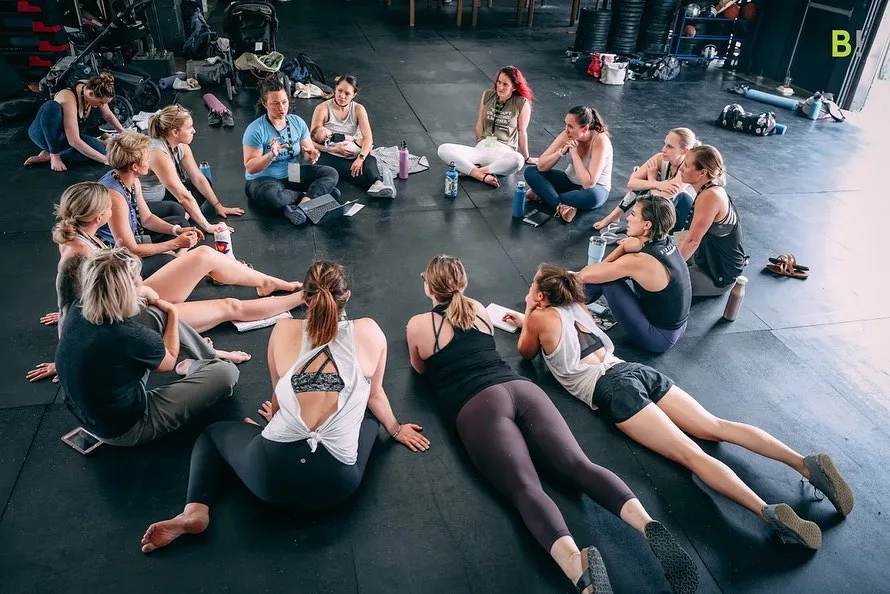
What are some of the most common conditions new moms work on for postpartum recovery?
The most common questions are about Diastasis Rectus Abdominus – ab separation. As babies we’re actually born with this condition and we learn to heal it as we grow and go through our movement milestones. We learn to stabilize, roll over, and use cross-body movements to fix DRA.
There are actually multiple different reasons for people to develop DRA – pre-existing shoulder conditions, a hip labrum tear, so many things influence core stability. And there’s still a ton of misinformation about it, like if you’re “too fit”, your abs will split because they’re too tight, or that it only happens during pregnancy. I’ve seen DRA a lot in very overweight men with central obesity.
Everyone will have some variation of ab separation by the end of pregnancy, but many will heal it by about 6-8 weeks postpartum. In the BIRTHFIT Basics, we address DRA in a number of ways like working to enhance your breathing patterns, dialing in your functional movements, and reconnecting with your pelvic floor.
How can dads and partners help support mom’s fitness goals?
Most women come to fitness because it’s a stress relief, and they end up staying because it’s really fun to socialize and workout with our friends. Finding community and connection is huge for so many new moms. When your wife becomes pregnant, don’t make exercise the first thing you take away. If that’s what your doctor suggests, maybe that doctor doesn’t understand your lifestyle or what’s valuable to you as a couple. Just be on your woman’s team from the beginning and don’t necessarily side with someone who’s like “let’s take away exercise” – I’ve seen that too many times.
Couples often do our Prenatal Program training days together at least one day a week. The way our programming is set up, they can both get the same kind of training stimulus from the workouts. It’s a great bonding experience for birth prep and it shows the mother that “ok, he’s really on my team, he’s showing up for me here.”
Remember: this is a journey that she’s got to go through, she’s got to find new places of strength in order to pull new life Earthside. As much as she wants to tag you in, that can’t happen, and it’s going to be so hard to watch your significant other going through this neverending workout, like Murph on steroids. Even though partners/boyfriends/husbands can’t take away the discomfort, they can be on her team and support her.
Count breaths for her, help her relax and stay in her body. Keep her hydrated, keep snacks around, and let her know she’s exactly where she’s supposed to be. Be the thinking brain, because she has to be in her body during birth. If labor is like a flowing river, you – the partner – are the protector of the banks of the river. You know her values and preferences and what she wants to happen after birth. She’s depending on you to be the keeper of those important things that ease the process.
The BEST thing you can do is talk about this stuff ahead of time and hire a doula!
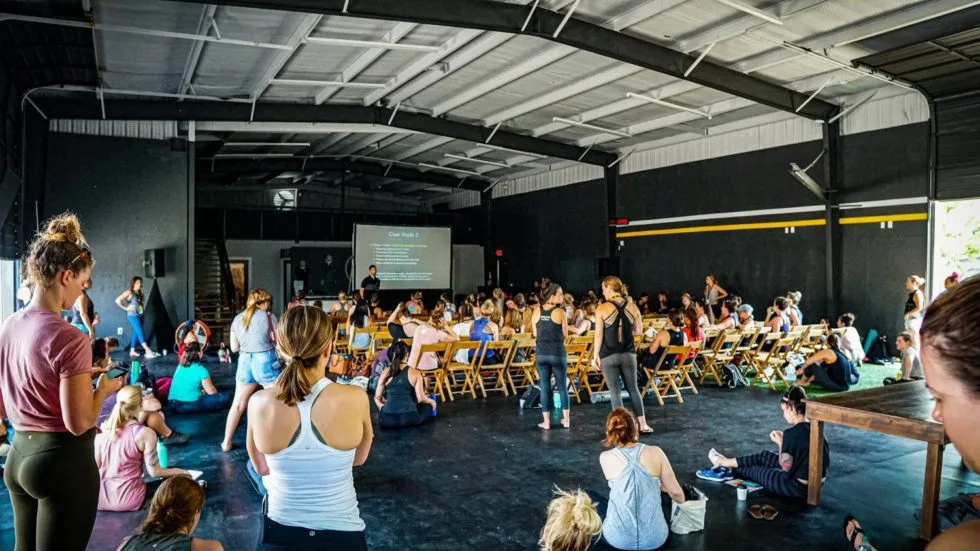
What kinds of mental exercises do your programs include?
One of the greatest courses I’ve ever done was to become an NLP practitioner – neuro-linguistic programming. It’s all about retraining thought patterns in our brain. I ask my doula clients, “When I say the word ‘birth’ what comes up for you?” Because oftentimes they have negative, painful words associated with birth. The first thing we do is start to alter the vocabulary. If the word “contraction” has a negative meaning to you, then we exchange it for words like “pressure” or “intensity”.
We also get really clear on your values and who you are as a family unit. We ask questions like, “How do you pick friendships or end relationships? What kind of qualities do you look for in a new church or business?” Mom and dad often have a few values that are the same and a few that are different, so I encourage open discussion. Because now you’re parents and you’ll have to make decisions together all the time as a team.
From those shared values we get into a Birth Mission Statement – our intention for birth. There are so many forks in the road and decisions to make along the birth process, and couples need a guiding light or compass to help make those decisions. Maybe you’re working with an OB who pressures you to induce. Go back to your mission statement and see what decisions might support or challenge that.
We do a few more things, like the Circle of Power exercise to physically feel and visualize what you want at your birth in sensory terms. What do you want to see, hear, feel, smell? And also what do you not want. Because you’re not gonna change who you are in labor, and the things that keep you in your body are essential. We start to cultivate that deep trust in your body through the prenatal workouts.
One of the things we say at the beginning is: you’re in season now, training for birth.
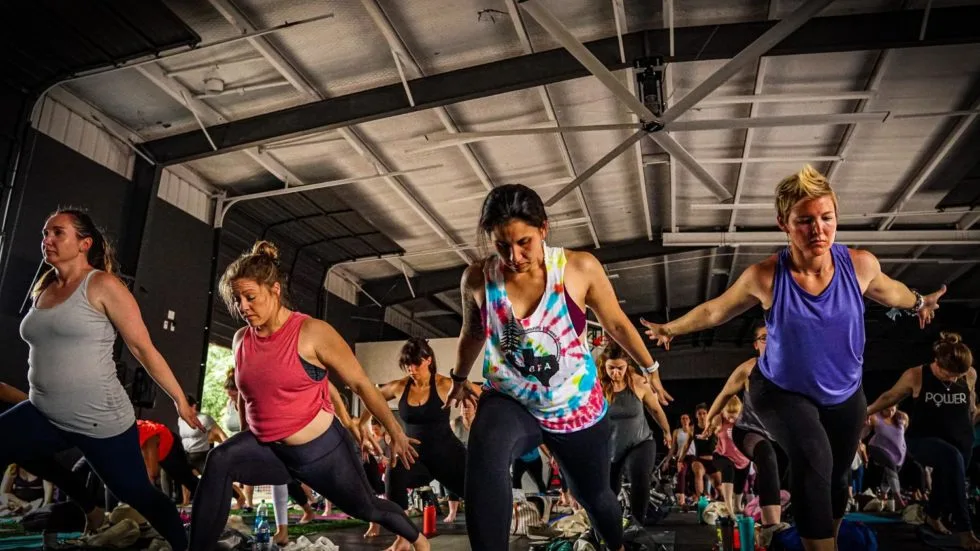
Tell us about some of your favorite BirthFit stories or fitness journeys!
I get messages all the time from people who have had a baby before, then for the second or third experience they follow our programs and come back with “I did not know it could be this good.” They’re so often just thoroughly surprised at approaching the process with new guidance.
One time, a good friend asked me to be her doula. She and her husband own a gym in Houston and at the time I was living in LA. When they reached out, I didn’t think it would happen because of the distance. But life has a funny way of working out – things in LA got shook up and in August of that year I decided to move back to Texas where I grew up. She was due in November.
I was grieving a breakup so I didn’t feel like my stellar self, but just watching them use everything we practiced was astounding. Seeing the dad support the mom and just show up fully was amazing, it made my job so easy. Seeing them in action was a huge reminder of why I do what I do and it reignited the flame. I almost didn’t take their money because I felt like they brought my soul back.
I also got to be at Luke and Ashley’s birth – from PowerAthlete. He was another stellar dad who stuck out to me. Just seeing him be in awe of what Ashley was capable of and how she just frickin’ handled herself was amazing. He was so funny, too – when we got to her room at the birth center, it was just the three of us. He was like, “ok, what do we do now??” and I just said, “now we wait.” He had that athlete mentality of being so ready to make stuff happen.
I love being able to watch the dads’ eyes change when they see their wives as superheroes.
HAPPY MOTHER’S DAY FROM TRAINHEROIC TO ALL THE MOMS AND MOMS-TO-BE OUT THERE!
TRAIN WITH THE B! COMMUNITY
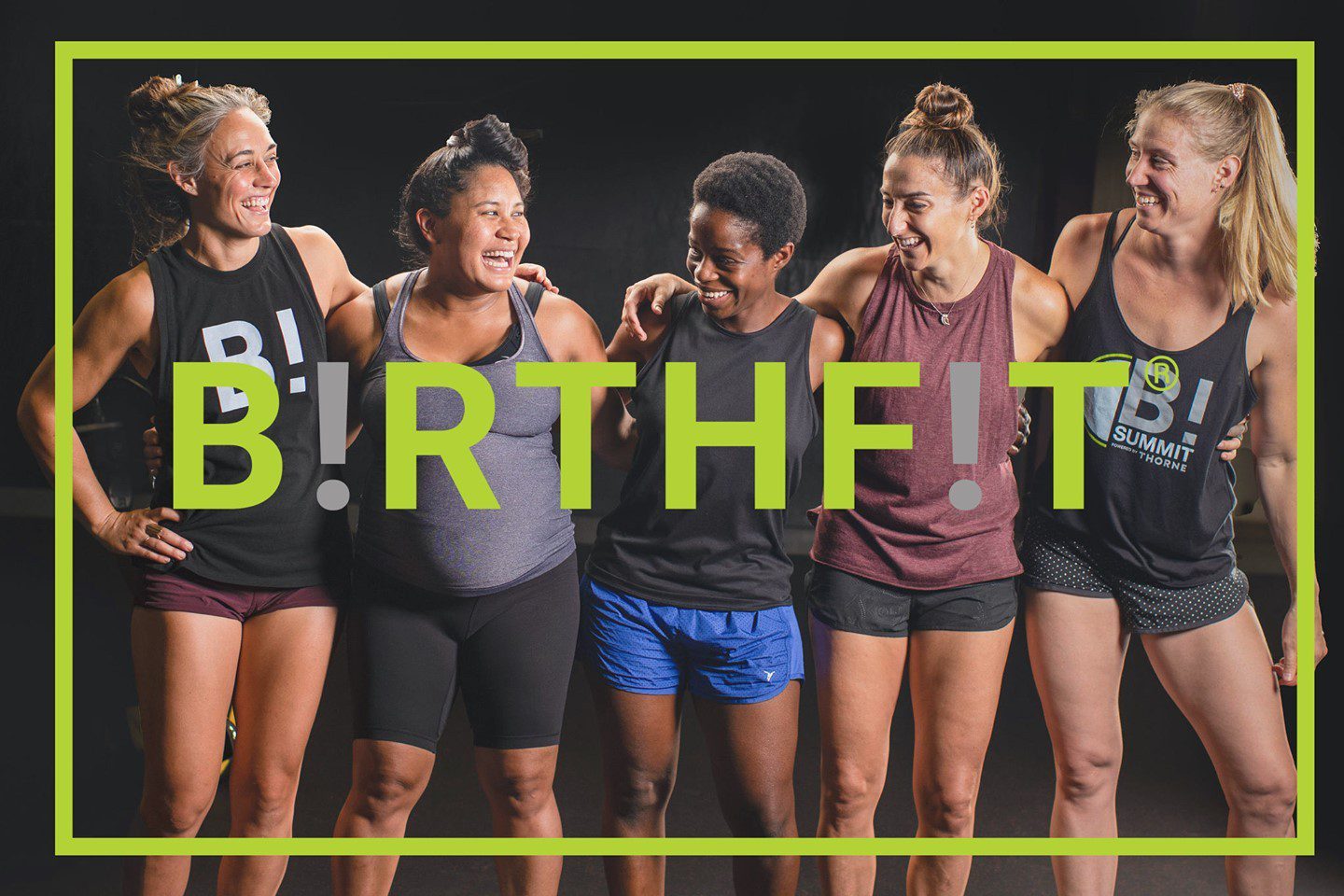
B! Community is general strength and conditioning for women in all seasons and cycles of life.
This is our unique programming style applied to general strength and conditioning. You receive four workouts each week with options for those with limited equipment and variations on movements.
We recognize everyone is in a different part of their journey, so this program is here to support you where you are.
Find Your Perfect Training Plan
Sometimes all you need to reach your destination on your fitness journey is an expert guide. Look no further, we've got you covered. Browse from thousands of programs for any goal and every type of athlete.
Try any programming subscription FREE for 7 days!
Related Articles
You May Also Like...
How To Zercher Squat: One Exercise To Rule Them All
We all want that golden ticket. The one-size-fits-all exercise and perfect program. You know – the one that makes us look like the Hulk as long as we follow that program to the T. Well folks, that all sounds great. But in reality, we know there is no one-size-fits-all...
What Does Paralympic Strength Training Look Like?
Paralympians undergo rigorous training when preparing for the Paralympic Games. While the Paralympics only last about two weeks, getting ready takes place all year, as these athletes are among the most dedicated in the world. Here’s how people with disabilities...
Top 6 Exercises for Managing Shoulder Injuries
What to Do for an Injured Shoulder After 6 years of coaching at the highest levels across multiple disciplines, the most common issues I see in my sports therapy clinic have to do with the shoulder. Statistics show us that shoulders are the most commonly injured area...
How To Zercher Squat: One Exercise To Rule Them All
I have a secret weapon exercise that will get us really close; it has a lot of bang for its buck. It builds massive quads, big glutes, a wide back, and some awesome biceps. Exactly what every athlete needs.
What Does Paralympic Strength Training Look Like?
Paralympians undergo rigorous training when preparing for the Paralympic Games. While the Paralympics only last about two weeks, getting ready takes place all year, as these athletes are among the most dedicated in the world. Here’s how people with disabilities...


Want more training content?
Subscribe
For Coaches
For Athletes
About
Support
Training Lab
Access the latest articles, reviews, and case studies from the top strength and conditioning minds in the TH Training Lab!
Made with love, sweat, protein isolate and hard work in Denver, CO
© 2024 TrainHeroic, Inc. All rights reserved.
